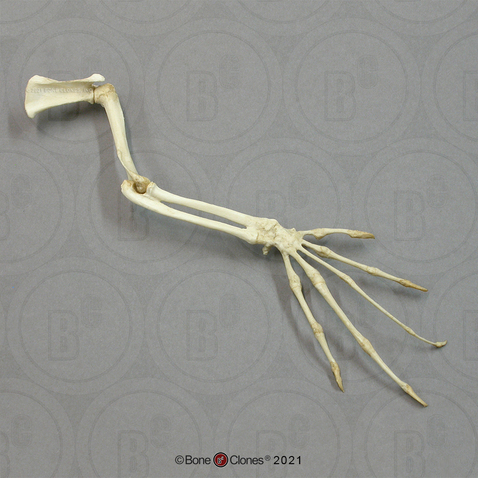-
Fields of Study
- K-12 Education
- Advanced Anatomy
- Forensics
- Physical Therapy
- Primate Locomotion
- Non-primate Locomotion
- Biological Anthropology
- Paleontology
- Bioarchaeology
- Marine-Aquarium
- Veterinary
-
Zoology
- All Zoological Items
- Endangered Species
- Skulls
- Skeletons
- Cranial Elements
- Postcranial Elements
- Eggs
- Limbs
- Teeth & Fangs
- Claws & Talons
- Brains & Endocasts
- Life Casts
- Pathology & Trauma
- Wildlife Forensics
- Sets
- Bird Sets
- Accessories
- Birds
- Mammals
- Reptiles & Amphibians
- Fish
- Sharks & Rays
- Turtles & Tortoises
- Anatomy for the Artist
- Decor
- Veterinary
- Elements
- Pathology & Trauma
-
Sets & Series
- Natural History Gift Ideas
- Decor
- Scale & Sculpture
- 3D Scanned & Printed
- Bone Boxes
- Locomotion Sets
- Forensic Sets
- Advanced Anatomy Sets
- Physical Therapy Series
- Fetal Sets
- Economy Series
- Zoology Sets
- Bird Sets
- Claw & Talon Sets
- Tooth & Fang Sets
- Primate Skull Sets
- Fossil Hominid Sets
- B.I.O.P.S.I. - Babiarz Institute
- Maxwell Collection
- Bergdorf Goodman Windows
- Accessories
- New Products
-
Our Company
- News & Specials
- Printable Handouts
- About Us
- Why Choose Bone Clones
- Bone Clones in the News
- Mission
- Contact Us
- Privacy and Security
- FAQs
- Testimonials
- Community Outreach
- Legal/Copyright
- Flyers
- Choosing Original Specimens
- Museum Exhibitions
- Natural History Gift Ideas
- About the Economy Series
- Acknowledgements
- Ordering & Delivery
- Warranty
- Refund/Return Policy
- Osteological Evaluation Reports
- About 3D Printing
- Sawyer & Maley Neanderthal Reconstruction
- Newsletter Archive
-
Human Anatomy
- All Human Anatomy
- Human Skulls
- Human Skeletons
- Head & Neck
- Postcranial Elements
- Advanced Anatomy
- Physical Therapy / Joints
- Human Brains & Endocast
- Human Life Casts
- Maxwell Museum
- Sets & Series
- Accessories
- Osteological Evaluation Reports
- Featured
- Adult Human Anatomy
- Adolescent Human Anatomy
- Child Human Anatomy
- Fetal Human Anatomy
-
Zoology
- All Zoological Items
- Endangered Species
- Skulls
- Skeletons
- Cranial Elements
- Postcranial Elements
- Eggs
- Limbs
- Teeth & Fangs
- Claws & Talons
- Brains & Endocasts
- Life Casts
- Pathology & Trauma
- Wildlife Forensics
- Sets
- Bird Sets
- Accessories
- Birds
- Mammals
- Reptiles & Amphibians
- Fish
- Sharks & Rays
- Turtles & Tortoises
- Fossil Hominids
- Non-human Primates
- Paleontology
- Forensics
All items sold on this website are replicas; no real/natural bone is available on this site. Bone Clones® are 1:1 scale unless stated otherwise. All Bone Clones® products are made in the USA.
- Madagascar ,
- Aye-Aye ,
- Primate ,
- Articulated Arm ,
- Arm
 ALSO SEE:
ALSO SEE:
Articulated Aye-aye Arm
KO-163 $225.00
Articulated, rigid aye-aye right arm (joints do not bend). Note: this arm is not associated with Bone Clones® aye-aye skeleton SC-353.
From the rainforests of Madagascar, the aye-aye is, perhaps, the strangest of the primates. They were first classified as rodents due to their rodent-like incisors. About the size of a house cat, they have very large bat-like ears, large eyes and a flat face. They lack canines and have large incisors similar to rodents which continue to grow and, like rodents, have enamel only on the front surface. There is a large gap between the incisors and the molars (where most primates have canines). All the digits have claws with the exception of the big toes, which have nails.
Their fingers are mostly long and narrow and the 3rd finger has a special adaptation: it is narrower than the others and can practically swivel in all directions. The aye-aye uses this 3rd finger to tap on trees while listening with its big ears for a hollow area that may contain insect larvae. When it discovers the larvae, the aye-aye carves away the bark with its rodent-like teeth exposing the tree cavity. It uses its 3rd finger to search for the larvae and, when found, spears and pulls them out.
We are grateful to the Harvard Museum of Comparative Zoology for the loan of this wonderful specimen.
Conservation Status: Endangered
| Scientific Name | Catalogue # | Size | Price |
| Daubentonia madagascariensis | KO-163 | 7" Long | $225.00 |
Related Products:
-
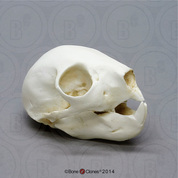 Aye-aye Skull, Sub-adult
Aye-aye Skull, Sub-adult -
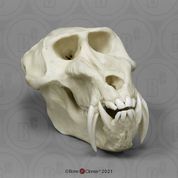 Mandrill Baboon Skull, Male
Mandrill Baboon Skull, Male -
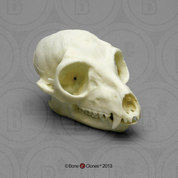 Ring-tailed Lemur Skull
Ring-tailed Lemur Skull -
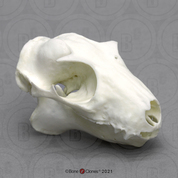 Colugo, Flying Lemur Skull
Colugo, Flying Lemur Skull -
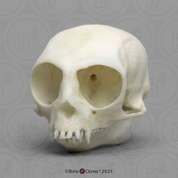 Pygmy Marmoset Skull
Pygmy Marmoset Skull -
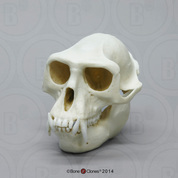 Hanuman Langur Skull
Hanuman Langur Skull -
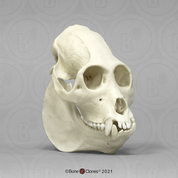 Mantled Howler Monkey Skull
Mantled Howler Monkey Skull -
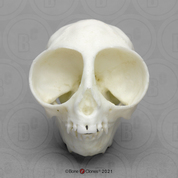 Owl Monkey Skull
Owl Monkey Skull -
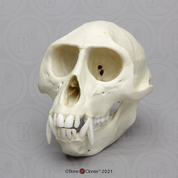 Vervet Monkey Skull
Vervet Monkey Skull -
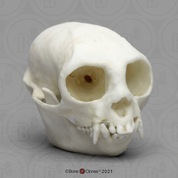 Cotton-top Tamarin Skull
Cotton-top Tamarin Skull -
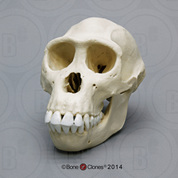 Bonobo Skull, Female
Bonobo Skull, Female -
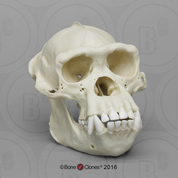 Chimpanzee Skull, Adult Male
Chimpanzee Skull, Adult Male -
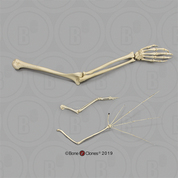 Homologous Structures: Forelimbs, Set of 3
Homologous Structures: Forelimbs, Set of 3 -
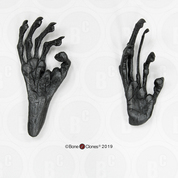 Aye-aye Hand and Foot Life Cast Set, Right
Aye-aye Hand and Foot Life Cast Set, Right -
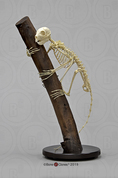 Aye-aye Skeleton, Articulated
Aye-aye Skeleton, Articulated
Newsletter Signup
9200 Eton Ave.
Chatsworth, CA 91311 USA
© 1992-2026 Bone Clones Holdings. All Rights Reserved.
Customer Service
© 2026 BONE CLONES HOLDINGS / Made by MEV




